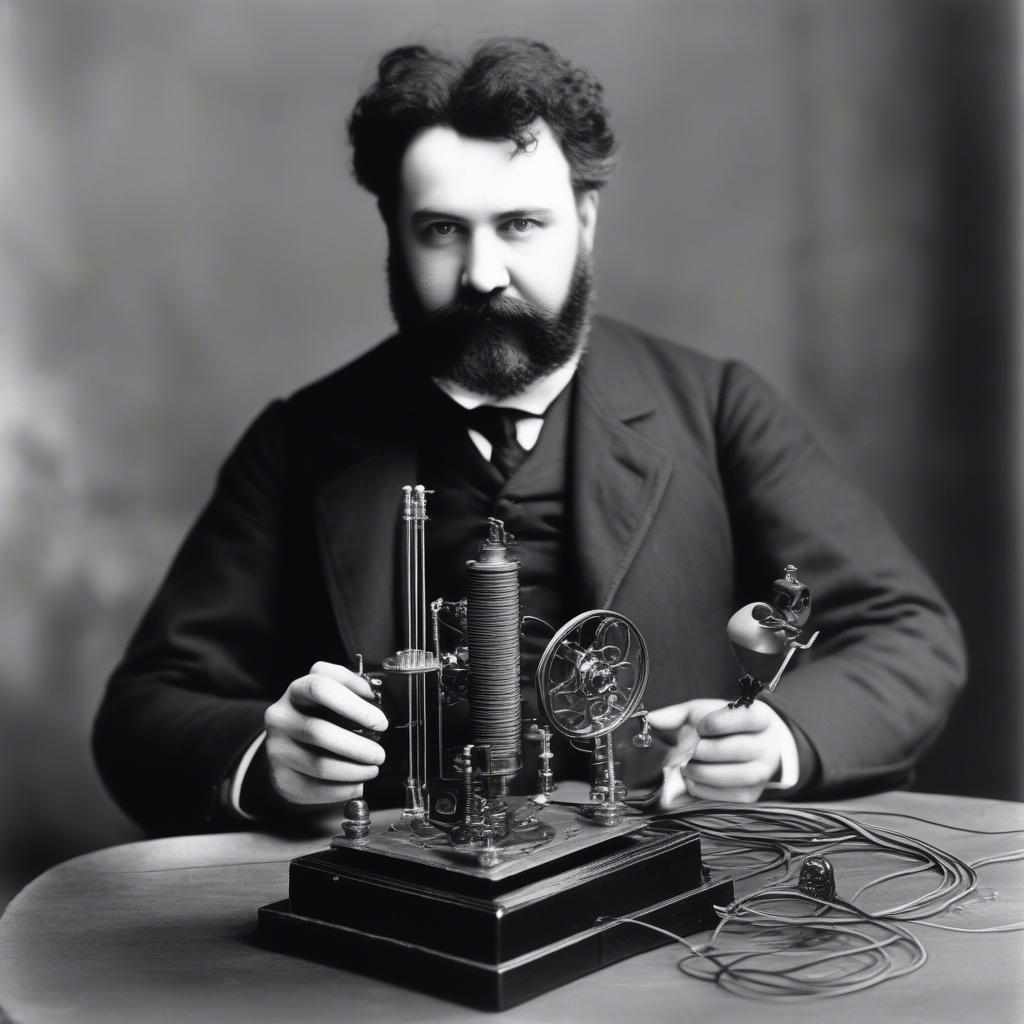
Alexander Graham Bell is widely credited with inventing the telephone, a groundbreaking invention that revolutionized communication. His journey to this pivotal moment in history is a fascinating blend of scientific inquiry, personal perseverance, and a touch of controversy. While Bell’s name is synonymous with the telephone, the story of its invention is more nuanced than a single individual’s achievement. who invented the cell phone explains a similar invention process for mobile phones.
Table Content:
- The Path to the Telephone: Early Influences and Experimentation
- Bell’s Breakthrough: The Talking Telegraph
- The Patent Race and Controversy: Other Claimants to the Throne
- The Impact of the Telephone: A World Connected
- From Invention to Icon: The Evolution of the Telephone
- The Legacy of Alexander Graham Bell: More Than Just the Telephone
- The Telephone in the Digital Age: A Constant Companion
- Conclusion: A World Transformed by a Simple Idea
- FAQ
The Path to the Telephone: Early Influences and Experimentation
Bell’s fascination with sound and communication stemmed from his family background. His grandfather, Alexander Bell, was an elocution teacher, and his father, Melville Bell, developed Visible Speech, a system for teaching the deaf how to speak. This upbringing steeped Bell in the intricacies of vocalization and the mechanics of sound production. He began experimenting with transmitting speech electronically in the early 1870s, inspired by the telegraph, which could send messages over long distances using electrical signals.
Bell’s Breakthrough: The Talking Telegraph
Bell’s relentless experimentation culminated in a pivotal moment on March 10, 1876. He successfully transmitted a recognizable voice over his device, uttering the now-famous words, “Mr. Watson, come here, I want to see you.” This marked the birth of the telephone, a device Bell initially referred to as the “talking telegraph.” This invention wasn’t simply a technological feat; it was a paradigm shift in how humans interacted and connected.
 Alexander Graham Bell with his first telephone invention
Alexander Graham Bell with his first telephone invention
The Patent Race and Controversy: Other Claimants to the Throne
While Bell is celebrated as the inventor of the telephone, his claim wasn’t without challengers. Elisha Gray, another inventor, filed a patent caveat for a similar device on the same day as Bell. This led to a protracted legal battle, with several other inventors also claiming to have conceived of the telephone before Bell. The ensuing legal disputes highlight the competitive landscape of invention during that era.
The Impact of the Telephone: A World Connected
The telephone’s impact on society was profound and far-reaching. It transformed personal communication, enabling people to connect across vast distances in real-time. It revolutionized businesses, facilitating faster transactions and collaboration. It even reshaped social structures and cultural norms, fostering a more interconnected world.
 The impact of early telephones on global communication
The impact of early telephones on global communication
From Invention to Icon: The Evolution of the Telephone
From its humble beginnings as a bulky and fragile device, the telephone has undergone a remarkable evolution. From rotary dials to touchscreens, from landlines to smartphones, the telephone has continually adapted to technological advancements and changing user needs. This evolution reflects the ingenuity and innovation that have driven the development of communication technology.
The Legacy of Alexander Graham Bell: More Than Just the Telephone
Bell’s legacy extends beyond the invention of the telephone. He was a prolific inventor, contributing to advancements in various fields, including aeronautics and hydrofoils. He was also a passionate advocate for the deaf community, dedicating much of his life to improving their lives through education and technological innovations.
The Telephone in the Digital Age: A Constant Companion
In the digital age, the telephone has become more than just a communication device; it’s a constant companion, a portal to information, entertainment, and social connection. From smartphones to smart speakers, the telephone has integrated seamlessly into our daily lives, shaping how we interact with the world around us. Similar to the telephone, who invented the cell phone tells the story of how mobile phones have become ubiquitous in modern life.
Conclusion: A World Transformed by a Simple Idea
The invention of the telephone, while often attributed to Alexander Graham Bell, is a testament to human ingenuity and the power of innovation. It’s a story of perseverance, controversy, and ultimately, a world transformed by the simple idea of connecting voices across distances. From its initial conception to its ubiquitous presence in modern life, the telephone continues to shape how we communicate, interact, and experience the world.
FAQ
When was the telephone invented? The first successful voice transmission by telephone occurred on March 10, 1876.
Who besides Alexander Graham Bell claimed to have invented the telephone? Elisha Gray is perhaps the most notable challenger, having filed a patent caveat on the same day as Bell.
How did the telephone impact society? The telephone revolutionized communication, business practices, and even social structures, fostering a more interconnected world.
How has the telephone evolved over time? From bulky rotary phones to sleek smartphones, the telephone has undergone continuous evolution, adapting to technological advancements and changing user needs.
What is Alexander Graham Bell’s legacy beyond the telephone? Bell contributed to advancements in various fields like aeronautics and hydrofoils and was a dedicated advocate for the deaf community.
What is the role of the telephone in the digital age? The telephone has become an essential tool for communication, information access, entertainment, and social connection in the digital age.
Why is the invention of the telephone considered so important? It fundamentally changed the way humans communicate, bridging vast distances and fostering closer connections across the globe.
